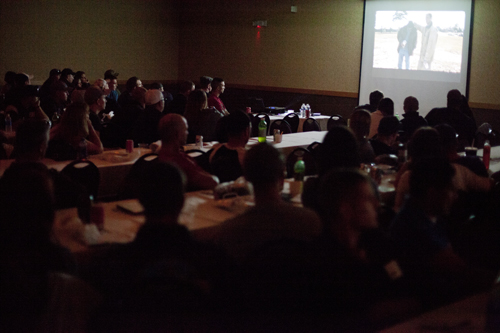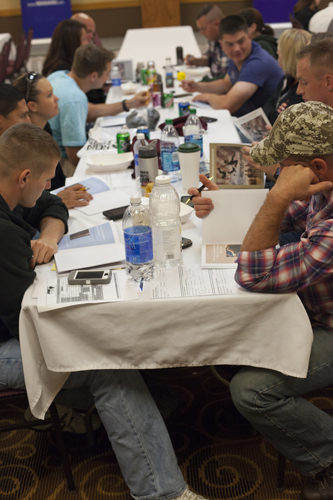By Rachel Leingang, News21

Members of the North Dakota National Guard’s 818th Engineer Company watch “Brothers at War,” a documentary made by Jake Rademacher, who imbedded with his brothers in Iraq to try to understand them better. (Photo by Peter Haden, News21)
Jake Rademacher was trying to understand what his brothers were experiencing. Rademacher’s two brothers served in the Army and shared a bond that as a civilian, he didn’t understand. So the filmmaker and actor decided to visit his brothers – in Iraq – while they were deployed and film a documentary.
“Brothers at War,” is now used as a workshop for returning National Guard and Reserve troops at Yellow Ribbon Reintegration Program events across the country. Service members watch the film with family, then write journal entries and discuss the feelings and issues the movie evokes.
“What were the tough things about coming home for you?” and “How have your relationships changed with people who have not deployed?” ideally spark meaningful conversations for the soldiers and their families and help to deepen understanding on both sides.
The North Dakota National Guard’s 818th Engineer Company participated in the workshop during a Yellow Ribbon event in June. The 818th returned in March from a deployment to the southern Helmand Province in Afghanistan.
“You get to watch a movie,” Spc. Brad Sherman said. “That’s awesome. You get to sit down, kick back, and watch a pretty interesting movie… It doesn’t take everybody to walk overseas and say, ‘Hey can I get a plane ticket to Iraq?’… It’s pretty ballsy, he’s a pretty brave soul.”
The soldiers relate to Rademacher’s brothers, Isaac and Joe, while family members can relate to Jake’s wanting to understand what loved ones are going through, knowing that they never fully will.

North Dakota National Guard members from the 818th Engineer Company write in their “Brothers at War” journals after watching the film. The workshop inspires conversations about being at war, coming home and relating to family. (Photo by Peter Haden, News21)
“You could definitely tell the emotions from the soldier’s perspective through Jake’s brothers and with Jake, as far as being the non-military member – those dynamics were interesting to see and I thought they were really true to life,” said Capt. Tom Leingang, a part of the Headquarters unit for the 818th.
Most importantly, the film allowed members of the 818th to discuss their feelings about reintegrating into civilian life.
“Any time you can get conversations going between soldiers, or do events with these reintegrations or Yellow Ribbon stuff, where soldiers can talk to each other, where they can open up to each other, or with their families, I think it’s important – I think it’s critical,” Leingang said.

